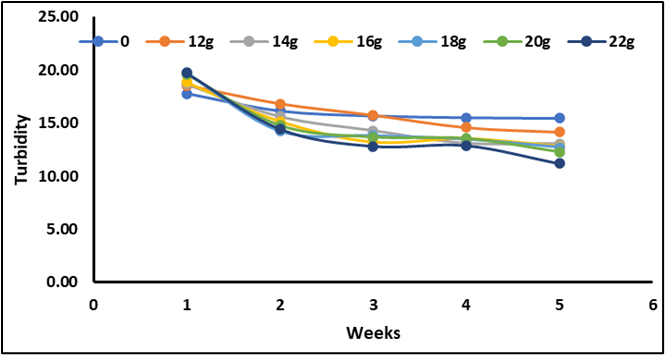Effectiveness of Moringa oleifera for Abattoir Wastewater Treatment
DOI:
https://doi.org/10.62050/nb0qzd75Keywords:
Abattoir wastewater, Moringa oleifera, Physio-chemical parametersAbstract
Humans and the environment can be harmed by poor management of liquid effluents, solid waste, and offensive odour from meat processing. For five (5) weeks, the performance evaluation of Moringa oleifera seed as a coagulant for the treatment of abattoir wastewater was investigated. The treatment used a completely randomized design with loading dosages of 12, 14, 16, 18, 20, and 22g/500 mL of processed Moringa oleifera seed. A control group of wastewaters from the slaughterhouse located in Minna that had not been treated with Moringa oleifera was also included as a control. The chemical characteristics of abattoir wastewater were studied both before and after treatment with Moringa oleifera. In the fifth week, Moringa oleifera seeds appreciably removed turbidity with high percentage value of 56.6% from 17.80mg/l to 11.20mg/l using 22g/500ml. Total alkalinity concentration in the sample decreased rapidly in the first week from 216.67 mg/l for control to 63.67 mg/l at 22g which represents 70.61 % reduction which happens to be the optimum dosage based on the observations. Moringa oleifera reduced the total hardness efficiently to its minimum from 141mg/l at week 1 to 69.200mg/L at week 5 with removal efficiencies of 51.18% at 22g/500ml dosage concentration. The optimum dosage was 69.200 mg/L with 22 g/500ml observed at week 5. Decrease in the Dissolved Oxygen levels from 4.67 mg/L to 2.07mg/l at week 5 for 22g was observed showing a total decrease of 55.67%. Phosphate was reduced from 2.26 mg/l to a minimum of 0.57mg/l at weeks 4 and 5 at 16g/500ml with maximal removal efficiency of 74.78% below the NSDWQ of 10mg/L. Moringa reduced the Electrical conductivity of abattoir waste water from 1395.67mg/L to 652.67mg/L at week 1 below NSDWQ of 1000mg/L but increased with greater settling time (week 2 to 5) and dosage concentration. For Calcium, the natural coagulant Moringa oleifera, produced a substantial decrease in calcium contents of the wastewater at different concentrations with optimum removal efficiency of 70.09% at 16g/L dosage concentration in week 5. At optimum dosage of 22g/L concentration, Moringa at week 5 reduced the Zinc to 0.41mg/l with removal efficiency of 71.13%. The high content of zinc has been attributed to high blood volume found in wastewaters. Moringa oleifera has thus been confirmed as an effective natural coagulant which can be used in improving the physicochemical characteristics of water.
Downloads



